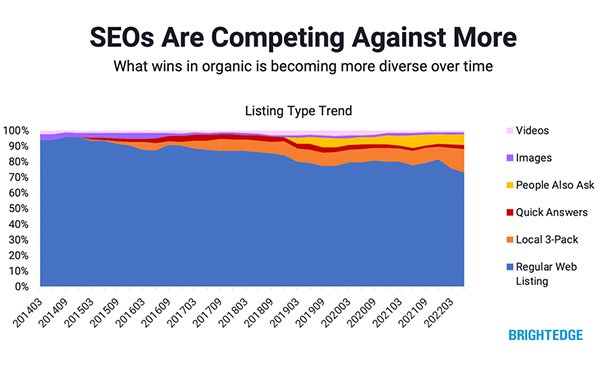
Things are changing in search, with about
78% of SEO teams among BrightEdge customers saying they no longer create annual budget and strategy plans.
Not that SEO experts have pushed planning to the side, but rather they have changed
the “cadence” to become more agile. What does that look like?
“It was a bit of surprise, because businesses typically run on annual spending budgets,” said BrightEdge
Founder Jim Yu. “We also found that 75% had to change course due to changes made by Google. Because changes are happening at such a fast pace, I think they are planning that they will need to
change every quarter.”
There’s also more of an internal shift in priorities, with 50% of SEOs prioritizing work around internal logistical issues.
Priorities are shifting
based on macro and business economics.
advertisement
advertisement
Executives at organizations are being asked to produce higher return on investments, so they are leaning more heavily on SEO teams, Yu says. SEO experts
are being asked to share the data with more departments within their companies.
“How do you drive a higher impact with limited dollars?” Yu asks.
SEOs must improve ROI and
reduce costs -- through the ability to sense and respond to new market needs, optimize the conversion experience to get more from existing customers, and conquest market share across different
mindsets.
Reducing costs requires automating critical tasks and reducing manual work, preserve traffic while cutting media investments -- something Google and Microsoft are trying to do with
paid search.
Yu points to an interesting example. While departments outside of search have been long asked to look at search data to identify trends, in the travel industry, one global airline
went to their network of travel agents to leverage search data. It helped the airline to expand landing pages and find new keywords to build helpful content being used by consumers.
Being agile and flexible are two key areas that SEO experts will need to focus on in 2023.
Yu offers the following advice for 2023:
- Focus on what can be controlled and how to
collaborate with other teams
- Sustainable SEO is all about making the work streams between groups clear and simplifying the processes along the way
- Ensure that the teams leverage
technology to reduce the manual work they have to do
- Focus on what can be controlled -- issues that are urgent and important
- Add value by collaborating across the
organization
- Break work into milestones that SEO teams can focus on in phases
- Be agile and flexible to manage success
- Plan -- but be prepared to be planning quarterly,
not just yearly
- Ensure SEO teams align everything with broader business benefit.